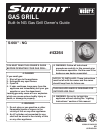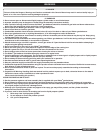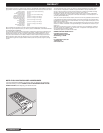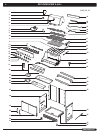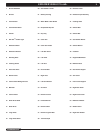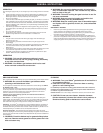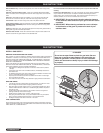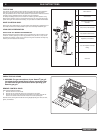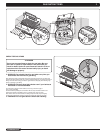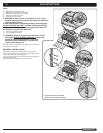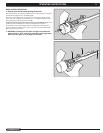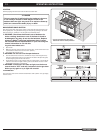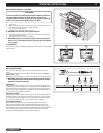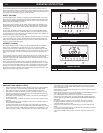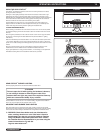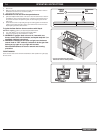Special offers from our partners!

Find Replacement BBQ Parts for 20,308 Models. Repair your BBQ today.

Buy Weber Grill Parts. It couldn't be easier. Find your Weber parts here.

7
www.weber.com
®
Slide out Bottom tray - Remove excess grease, then wash with warm soapy water,
then rinse.
Flavorizer
®
bars and Cooking grates - Clean with a suitable stainless steel bristle
brush. As needed, remove from grill and wash with warm soapy water, then rinse with
water.
Catch pan - Disposable foil trays are available, or you can line the catch pan with
aluminum foil. To clean the catch pan, wash with warm soapy water, then rinse.
Thermometer - Wipe with warm soapy water; clean with plastic scrub ball.
Inside cooking module - Brush any debris off of burner tubes. DO NOT ENLARGE
BURNER PORTS (OPENINGS). Wash inside of cooking box with warm soapy water
and a water rinse.
Inside Lid - While lid is warm, wipe inside with paper towel to prevent grease build-up.
Flaking built-up grease resembles paint flakes.
Stainless steel surfaces - Wash with a soft cloth and a soap and water solution. Be
careful to scrub with the grain direction of the stainless steel.
Do not use cleaners that contain acid, mineral spirits or xylene. Rinse well after
cleaning.
Preserve Your Stainless Steel - Your grill or its cabinet, lid, control panel and shelves
may be made from stainless steel. To keep the stainless steel looking its best is a
simple matter. Clean it with soap and water, rinse with clear water and wipe dry. For
stubborn particles, the use of a non-metallic brush can be used.
m IMPORTANT: Do not use a wire brush or abrasive cleaners
on the stainless steel surfaces of your grill as this will cause
scratches.
m IMPORTANT: When cleaning surfaces be sure to rub/wipe
in the direction of the grain to preserve the look of your
stainless steel.
Gas instructions
Gas instructions
A
INSTALL GAS SUPPLY
GENERAL SPECIFICATIONS FOR PIPING
Note: Contact your local municipality for building codes regulating outdoor gas barbecue
installations. In absence of Local Codes, you must conform to the latest edition of the
National Fuel Gas Code: ANSI Z 223.1/NFPA 54, or CAN/CGA-B149.1, Natural Gas
and Propane Installation Code. WE RECOMMEND THAT THIS INSTALLATION BE
DONE BY A PROFESSIONAL.
Some of the following are general requirements taken from the latest edition of the
National Fuel Gas Code: ANSI Z 223.1/NFPA 54, or CAN/CGA-B149.1, Natural Gas
and Propane Installation Code for complete specifications.
• Thisbarbecueisdesignedtooperateat4.5inchesofwatercolumnpressure
(.163 psi).
• Amanualshut-offvalvemustbeinstalledoutdoors,immediatelyaheadofthe
quick disconnect.
• Anadditionalmanualshut-offvalveindoorsshouldbeinstalledinthebranchfuel
line in an accessible location near the supply line.
• Pipecompoundshouldbeusedwhichisresistanttotheactionofnaturalgas
when connections are made.
• Theoutdoorconnectormustbefirmlyattachedtorigid,permanentconstruction.
GAS LINE PIPING
• Ifthelengthofthelinerequireddoesnotexceed50feet,usea5/8"O.D.tube.
One size larger should be used for lengths greater than 50 feet.
• Gaspipingmaybecoppertubing,typeKorL;polyethyleneplastictube,witha
minimum wall thickness of .062 inch; or standard weight (schedule 40) steel or
wrought iron pipe.
• Coppertubingmustbetin-linedifthegascontainsmorethan0.3gramsof
hydrogen sulfide per 100 cubic feet of gas.
• Plastictubingissuitableonlyforoutdoor,undergrounduse.
• Gaspipingincontactwithearth,oranyothermaterialwhichmaycorrodethe
piping, must be protected against corrosion in an approved manner.
• Undergroundpipingmusthaveaminimumof18"cover.
TEST CONNECTIONS
All connections and joints must be thoroughly tested for leaks in accordance with local
codes and all listed procedures in the latest edition of the National Fuel Gas Code: ANSI
Z 223.1/NFPA 54, or CAN/CGA-B149.1
m DANGER
Do not use an open flame to check for gas leaks. Be sure
there are no sparks or open flames in the area while you
check for gas leaks. This will result in a fire or explosion
which can cause serious bodily injury or death and damage
to property.



